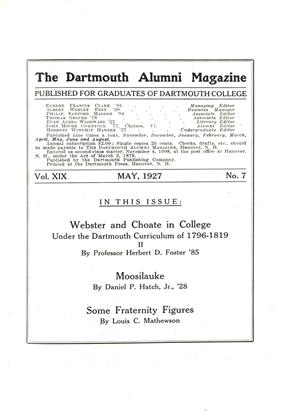(From The Columbia Alumni News)
Volcanic would perhaps be a better word. Just as the rule-makers change the system of play to open up the game and make it more attractive for player and spectator alike, when along comes a chill wind from the hills of New Hampshire. President Hopkins of Dartmouth College, suggesting
First: That eligibility for participation in intercollegiate football on varsity teams be limited to men in their sophomore and junior years in college.
Second: That intercollegiate football contests in the major games of the schedule be arranged on a reciprocal basis, by which each college should develop from the varsity squad two major teams, one of which should play at home and the other of which should play on the rival's home grounds. Third: That all coaching be done by undergraduates, presumably by seniors who had acquired knowledge and experience during their participation in intercollegiate athletics previously.
There is enough in these three suggestions to keep the hot-stove league going out-of-season until the boom of the soaring punt is again heard in the land. No matter what faults are found with the game of football, at least the accusation that it smothers debate can not be brought against it.
When Columbia saw fit to resume the game in 1915 one of the "regulations" provided for the elimination from the varsity team of any man who was exercising a professional option in college. That had the effect of barring a number of seniors so that we have had a taste of the first of the Hopkins proposals; some thought it pretty bitter medicine in as much as a football player is developed gradually and reaches his playing prime in his senior year. As a matter of fact the best coaches develop men that way. Physical and mental maturity are reached after a probationary period of several years either on the scrub team or in the substitute ranks. Yet the idea of shortening the playing time is not A new idea with President Hopkins; it has been urged before but colleges have not paid serious attention to the proposal.
The reciprocal game idea is most intriguing. It would eliminate much of the fall migration of students to big games. It would double the number of the big spectacles, which of itself would make it possible for double the number of people to see the big games. Revenue would be increased. Double the number of players would participate both in the games and in the practices during the entire season, and all in all the prospect seems most attractive. We prophesy that this suggestion is more likely to be followed than either of the others and we would not be surprised to see a trial made of the reciprocal idea before many seasons have passed. In 1926 Michigan and Minnesota played home and home games, but with only one varsity team. The chief practical difficulties are with such traditional contests as the Cornell-Pennsylvania game on Thanksgiving Day, which has always been played in Philadelphia at a time of the year that would make a reciprocal game in Ithaca doubtful because of weather conditions.
The fireworks, so far as hot-stove-league discussions are concerned, will come over the third proposal, namely that coaching be done by undergraduates. Theoretically this sounds entirely practical. For many years it was the custom at Yale for the captain of the preceding year to return the following fall as head coach, and he was surrounded by a corps of assistants acting in advisory capacities. This is only one year removed from President Hopkins' suggestion. It is now common practice in many colleges to retain on the coaching staff one or more of the outstanding graduating stars. If a proper system of physical supervision could be instituted with "senior coaching" so as to eliminate the possibility of immature boys taking the responsibility for physical injury due to exhaustion and other causes, the idea might be worked out fairly satisfactorily. On the other hand, in our opinion this would place a pretty heavy responsibility on rather youthful shoulders and we question whether it really belongs there. If the colleges will continue to pay more attention to the type of men who are engaged to teach their boys how to play the game, and if they will support these men, once selected, by not requiring continuous victories, the most objectionable features of professional coaching will soon disappear. The colleges, including the alumni, are to blame for these conditions in a perfectly good profession. Men like Wilce and Stagg, to mention two outstanding examples, are just as effective members of an academic community as the most skilled teacher on the staff. A group of college boys will gain more from wise guidance at the hands of mature men, then they will from one of their own fellows, even though he be without question a simon pure amateur.
We don't believe this is the idea back of this proposal of President Hopkins, however; we take it his interest is making it more and more a game between young men. The elimination of the coach from the bench during a game would in large measure accomplish this and would put the team absolutely on its own. This has been discussed for some years and in some institutions has already been adopted.
 View Full Issue
View Full Issue
More From This Issue
-
 Article
ArticleWEBSTER AND CHOATE IN COLLEGE
May 1927 By Herbert Darling Foster '85 -
 Article
ArticleTHE UNDERGRADUATE CHAIR
May 1927 -
 Article
ArticleMOOSILAUKE
May 1927 By Daniel P. Hatch, Jr. '28 -
 Article
ArticleSOME FRATERNITY FIGURES
May 1927 By Louis C. Mathewson -
 Article
ArticleDARTMOUTH STUDENTS SAID TO BE IRRELIGIOUS
May 1927 -
 Class Notes
Class NotesClass of 1921
May 1927 By Herrick Brown








